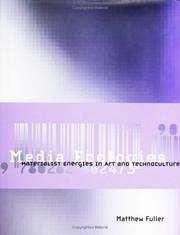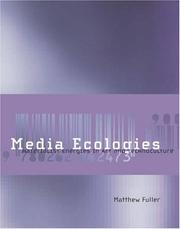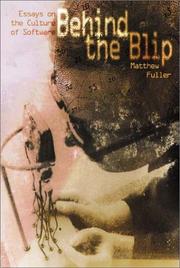| Listing 1 - 10 of 16 | << page >> |
Sort by
|

ISBN: 026206247X Year: 2005 Publisher: Cambridge, Mass. MIT Press
Abstract | Keywords | Export | Availability | Bookmark
 Loading...
Loading...Choose an application
- Reference Manager
- EndNote
- RefWorks (Direct export to RefWorks)
Aesthetics of art --- Mass communications --- Aesthetics, Modern --- Digital communications. --- Mass media --- Technology and the arts. --- Telecommunication. --- Aesthetics.
Book
ISBN: 9780262062749 9780262273343 0262273349 9781435647879 1435647874 0262062747 1282100203 9781282100206 9786612100208 Year: 2008 Publisher: Cambridge, Mass. : MIT Press,
Abstract | Keywords | Export | Availability | Bookmark
 Loading...
Loading...Choose an application
- Reference Manager
- EndNote
- RefWorks (Direct export to RefWorks)
This collection of short expository, critical and speculative texts offers a field guide to the cultural, political, social and aesthetic impact of software. Experts from a range of disciplines each take a key topic in software and the understanding of software, such as algorithms and logical structures.
departement Beeldende Kunst 08 --- Informatie- en communicatietechnologie --- Computer software. --- Computers and civilization --- Programming languages (Electronic computers) --- Technology and the arts. --- Lexicography. --- Arts and technology --- Arts --- Civilization and computers --- Civilization --- Software, Computer --- Computer systems --- Computer languages --- Computer program languages --- Computer programming languages --- Machine language --- Electronic data processing --- Languages, Artificial --- DIGITAL HUMANITIES & NEW MEDIA/Software Studies --- SOCIAL SCIENCES/Media Studies --- SCIENCE, TECHNOLOGY & SOCIETY/General
Book
ISBN: 9781509517152 9781509517169 1509517154 1509517162 Year: 2017 Publisher: Cambridge: Polity press,
Abstract | Keywords | Export | Availability | Bookmark
 Loading...
Loading...Choose an application
- Reference Manager
- EndNote
- RefWorks (Direct export to RefWorks)
Computer software and its structures, devices and processes are woven into our everyday life. Their significance is not just technical: the algorithms, programming languages, abstractions and metadata that millions of people rely on every day have far-reaching implications for the way we understand the underlying dynamics of contemporary societies.In this innovative new book, software studies theorist Matthew Fuller examines how the introduction and expansion of computational systems into areas ranging from urban planning and state surveillance to games and voting systems are transforming our understanding of politics, culture and aesthetics in the twenty-first century. Combining historical insight and a deep understanding of the technology powering modern software systems with a powerful critical perspective, this book opens up new ways of understanding the fundamental infrastructures of contemporary life, economies, entertainment and warfare.In so doing Fuller shows that everyone must learn 'how to be a geek', as the seemingly opaque processes and structures of modern computer and software technology have a significance that no-one can afford to ignore. This powerful and engaging book will be of interest to everyone interested in a critical understanding of the political and cultural ramifications of digital media and computing in the modern world.

ISBN: 9780262562263 Year: 2007 Publisher: London : MIT Press,
Abstract | Keywords | Export | Availability | Bookmark
 Loading...
Loading...Choose an application
- Reference Manager
- EndNote
- RefWorks (Direct export to RefWorks)

ISBN: 1570271399 Year: 2003 Publisher: Brooklyn, NY, : Autonomedia,
Abstract | Keywords | Export | Availability | Bookmark
 Loading...
Loading...Choose an application
- Reference Manager
- EndNote
- RefWorks (Direct export to RefWorks)
Book
ISBN: 1509517197 Year: 2017 Publisher: Cambridge, [England] ; Malden, [Massachusetts] : Polity,
Abstract | Keywords | Export | Availability | Bookmark
 Loading...
Loading...Choose an application
- Reference Manager
- EndNote
- RefWorks (Direct export to RefWorks)
Software engineering --- Psychological aspects. --- Social aspects.
Book
ISBN: 147428874X 1474288723 9781474288729 1474288707 9781474288705 1474288731 9781474288736 9781474288705 9781474288712 1474288715 9781474288743 Year: 2018 Publisher: London
Abstract | Keywords | Export | Availability | Bookmark
 Loading...
Loading...Choose an application
- Reference Manager
- EndNote
- RefWorks (Direct export to RefWorks)
"Sleep is quite a popular activity, indeed most humans spend around a third of their lives asleep. However, cultural, political, or aesthetic thought tends to remain concerned with the interpretation and actions of those who are awake. How to Sleep argues instead that sleep is a complex vital phenomena with a dynamic aesthetic and biological consistency. Arguing through examples drawn from contemporary, modern and renaissance art; from literature; film and computational media, and bringing these into relation with the history and findings of sleep science, this book argues for a new interplay between biology and culture. Meditations on sex, exhaustion, drugs, hormones and scientific instruments all play their part in this wide-ranging exposition of sleep as an ecology of interacting processes. How to Sleep builds on the interlocking of theory, experience and experiment so that the text itself is a lively articulation of bodies, organs and the aesthetic systems that interact with them. This book won't enhance your sleeping skills, but will give you something surprising to think about whilst being ostensibly awake."--Bloomsbury Publishing.
Sleep. --- Sleeping customs. --- Subconsciousness.
Book
ISBN: 9780262017855 9780262305327 0262305321 0262017857 1283574594 9781283574594 9786613887047 0262304406 Year: 2012 Publisher: Cambridge, Mass. : MIT Press,
Abstract | Keywords | Export | Availability | Bookmark
 Loading...
Loading...Choose an application
- Reference Manager
- EndNote
- RefWorks (Direct export to RefWorks)
A philosophical manual of media power for the network age. "Evil Media develops a philosophy of media power that extends the concept of media beyond its tried and trusted use in the games of meaning, symbolism, and truth. It addresses the gray zones in which media exist as corporate work systems, algorithms and data structures, twenty-first century self-improvement manuals, and pharmaceutical techniques. Evil Media invites the reader to explore and understand the abstract infrastructure of the present day. From search engines to flirting strategies, from the value of institutional stupidity to the malicious minutiae of databases, this book shows how the devil is in the details. The title takes the imperative "Don't be evil" and asks, what would be done any differently in contemporary computational and networked media were that maxim reversed. Media here are about much more and much less than symbols, stories, information, or communication: media do things. They incite and provoke, twist and bend, leak and manage. In a series of provocative stratagems designed to be used, Evil Media sets its reader an ethical challenge: either remain a transparent intermediary in the networks and chains of communicative power or become oneself an active, transformative medium."--Publisher.
Information society. --- Social media. --- Social networks. --- Société informatisée --- Médias sociaux --- Réseaux sociaux --- Networking, Social --- Networks, Social --- Social networking --- Social support systems --- Support systems, Social --- Interpersonal relations --- Cliques (Sociology) --- Microblogs --- User-generated media --- Communication --- User-generated content --- Sociology --- Information superhighway --- DIGITAL HUMANITIES & NEW MEDIA/New Media Theory --- SOCIAL SCIENCES/Media Studies --- PHILOSOPHY/Ethics & Bioethics
Book
ISBN: 9781788739085 1788739086 Year: 2021 Publisher: Brooklyn : Verso Books,
Abstract | Keywords | Export | Availability | Bookmark
 Loading...
Loading...Choose an application
- Reference Manager
- EndNote
- RefWorks (Direct export to RefWorks)
"Increasingly artists have become political activists. Their work has taken on the shape of a criminal investigator. Where does this turn toward forensics come from? How do we understand it as a aesthetic practice? The words investigative and aesthetics seem like an uneasy match. But this book claims that expanded aesthetic practices can powerfully reshape our approach to the question of truth. Shifts in technology and new ways of thinking together offer a means of searching for facts and understanding them anew. This book proposes that the current period is defined by new forms of "aesthetic power" composed both by sensing, detection and prediction and the torrential proliferation of images and data. To evade and oppose this form of state-corporate domination we can learn to join the dots between traces within our interwoven digital, built and natural environments. Investigative aesthetics can also enable new collaborative forms of verification. Rather than rely on official expertise it calls for an open process that combines the perspectives of communities exposed to state or corporate violence with those of artists, activists and scientists. This new practice takes place equally in the field, the art studio as in the scientific laboratory, online and in the streets, as it strives towards the construction of a new "common sensing"--
Aesthetics, Modern --- Art --- Esthétique --- Political aspects --- Aspect politique --- kunst --- architectuur --- kunsttheorie --- kunst en politiek --- kunst en maatschappij --- activisme --- eenentwintigste eeuw --- 7.01 --- Aesthetics --- Art and politics --- Politics and art --- History --- Political aspects.
Book
ISBN: 9781517905521 9781517905538 Year: 2019 Publisher: Minneapolis, Minn. University of Minnesota Press
Abstract | Keywords | Export | Availability | Bookmark
 Loading...
Loading...Choose an application
- Reference Manager
- EndNote
- RefWorks (Direct export to RefWorks)
Philosophy of nature --- Philosophy of science --- General ethics
| Listing 1 - 10 of 16 | << page >> |
Sort by
|

 Search
Search Feedback
Feedback About UniCat
About UniCat  Help
Help News
News